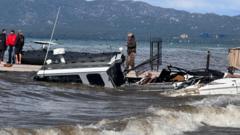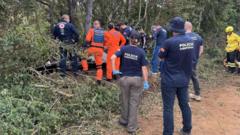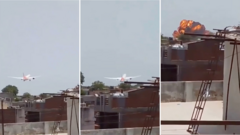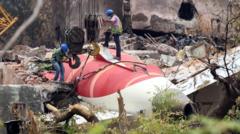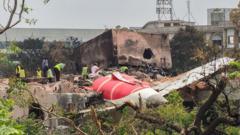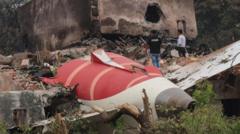**Five individuals, including a pilot and a child, managed to survive a harrowing ordeal after their plane went down in a swampy area. The timely intervention by local fishermen led to their rescue, as they navigated through a perilous environment filled with predators.**
**Five Miraculous Survivors Rescued from Alligator-Infested Swamp After Plane Crash**
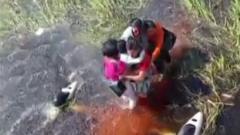
**Five Miraculous Survivors Rescued from Alligator-Infested Swamp After Plane Crash**
**In a dramatic rescue mission, five people spent over 36 hours atop a submerged aircraft while alligators lurked nearby following an emergency landing in Bolivia's Amazonas region.**
Five individuals were miraculously rescued after enduring a harrowing 36-hour experience atop their submerged plane in an alligator-infested swamp in the Amazonas region of Bolivia, local authorities reported. The small aircraft had been missing for 48 hours before local fishermen discovered it on Friday. The survivors, comprising three women, a child, and a 29-year-old pilot, were in "excellent condition," according to Wilson Avila, the director of the Beni Department's emergency operations center.
The search and rescue operation initiated on Thursday followed the aircraft's disappearance from radar in central Bolivia. Pilot Andres Velarde explained that engine failure necessitated an emergency landing near the Itanomas River while flying from Baures to Trinidad. Velarde described the tense moments as the plane lost altitude suddenly, forcing him to land it in a swamp close to a lagoon.
During their ordeal, the five survivors stood atop the plane, acutely aware that alligators were circling just three meters away. Velarde speculated that leaking fuel from the aircraft acted as a deterrent, helping to keep the predators at bay. He also recounted their sighting of an anaconda lurking in the water.
Since they had no available drinking water or means to escape the perilous situation, they subsisted on cassava flour brought by one of the passengers. Velarde remarked on the intensity of their experience, stating, “We couldn't drink water, and we couldn't go anywhere else because of the alligators.”
Upon discovery, a helicopter was dispatched to transport the survivors to medical facilities. Ruben Torres, the Director of the Beni Region Health Department, expressed gratitude for the collaborative efforts of various institutions that culminated in the survivors' safe return, remarking, “I am really happy because in the end all the institutions joined together to be able to find the missing people and save those lives.”
The search and rescue operation initiated on Thursday followed the aircraft's disappearance from radar in central Bolivia. Pilot Andres Velarde explained that engine failure necessitated an emergency landing near the Itanomas River while flying from Baures to Trinidad. Velarde described the tense moments as the plane lost altitude suddenly, forcing him to land it in a swamp close to a lagoon.
During their ordeal, the five survivors stood atop the plane, acutely aware that alligators were circling just three meters away. Velarde speculated that leaking fuel from the aircraft acted as a deterrent, helping to keep the predators at bay. He also recounted their sighting of an anaconda lurking in the water.
Since they had no available drinking water or means to escape the perilous situation, they subsisted on cassava flour brought by one of the passengers. Velarde remarked on the intensity of their experience, stating, “We couldn't drink water, and we couldn't go anywhere else because of the alligators.”
Upon discovery, a helicopter was dispatched to transport the survivors to medical facilities. Ruben Torres, the Director of the Beni Region Health Department, expressed gratitude for the collaborative efforts of various institutions that culminated in the survivors' safe return, remarking, “I am really happy because in the end all the institutions joined together to be able to find the missing people and save those lives.”



